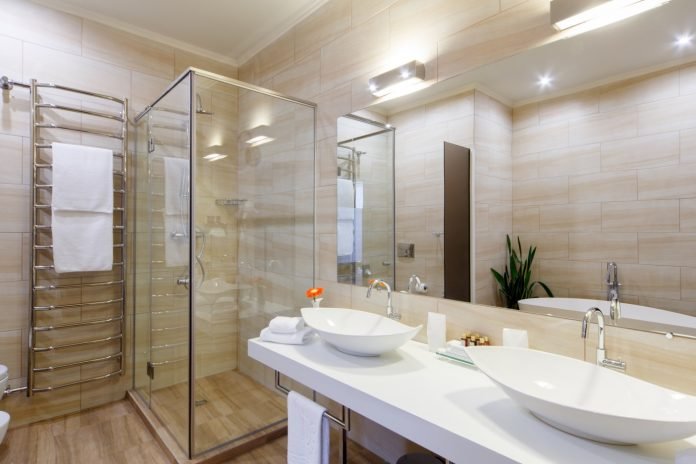Last Updated on July 13, 2024 by Asfa Rasheed
Of all American households that planned to remodel part of their property in 2021, 70 percent said the bathroom was their key focus. While faucets and fittings can be chosen based on aesthetics alone, one area that needs serious consideration is the floor. But do you know the options available?
With so many choices it can be hard to know where to begin. Read on as we discuss the best bathroom floor materials for your remodel.
Table of Contents
Porcelain And Ceramic Tile
Porcelain and ceramic tiles are the most popular bathroom floor materials. Not only are they ideal for use in watery, moist environments but they also have a life expectancy of around 75 to 100 years. This means once they have been laid, you probably won’t need to change them in your lifetime.
Tiles also come in a wide range of styles, patterns, and colors. You can even get tiles that look like they have a wood finish. Any good tile flooring company will have a wide range to suit your bathroom style and fittings.
Very little maintenance work is needed on tiles. You can mop and clean them to keep their luster but they don’t need any preventative work. Tiles are water-resistant and will not stain.
Finally, they come in a wide range of prices. That means even bathrooms constructed on a low budget can benefit from tile-based bathroom floor options.
The only downsides are that it can be troublesome to install. You should hire a professional fitter if you are not experienced in installation. Many people also find tiles are too cold and hard for their needs.
Vinyl Flooring
Vinyl flooring can be found in sheets, planks, or tiles. It can give you all the waterproof qualities that you get with ceramic tiles but at a much lower price. This has made it a popular choice for many people installing a new bathroom.
Sheet vinyl is extremely easy to install and will come in large rolls. In a small space, you may even be able to install it without any seams. Roll it out, cut it to size and you can install it yourself.
Planks and tiles are self-explanatory. You can find them with wood-look finishes that actually look extremely natural. Many have locking mechanisms so you can install them yourself with limited knowledge of DIY.
The downside to these types of floor covering is that they do not tend to last. You can expect around 15 to 20 years’ worth of use with a vinyl floor.
Your finish will also depend on how the floor underneath has been laid. If there are bumps and dips, this will be reflected in the flooring that is laid on top.
Natural Stone
There are very few downsides to using stone for a bathroom renovation. It is the most expensive option and can seriously raise your budget. The value will be held though, and if you sell at a later date you can expect to reclaim some of the cost with its resale value.
It can also be very cold to walk on and have in a room. Solving this involves using radiant heating solutions but this adds to the cost once more.
Aside from this, everything else is a benefit. The stone you choose will have existed for a long time and will continue to do so. It is by far the most durable option that is both waterproof and moisture resistant.
Engineered Hardwood
Solid wood is not the most intelligent choice for areas that contain water and moisture. It has a tendency to take in moisture through its porous surface, then it expands and contracts. If you want a wood finish throughout the house, engineered hardwood is the solution.
Instead of being a solid wood plank, engineered hardwood is made from different layers. Its base is plywood, ideal for holding up against moisture. At the top lies a natural veneer so it looks exactly like wood flooring in the rest of your home.
The downsides are that it can be expensive, especially if you want a veneer on top of an expensive wood type. You also have to be wary if you are sanding the flooring, as it is possible to sand through the veneer itself.
Cork Flooring
Cork flooring is becoming extremely popular due to its eco-friendly nature. It has a number of advantages over other materials, because it has the water-resistant properties of stone and tile but with one major advantage. unlike tile and stone, cork actually feels warm and soft under the feet.
Microbial properties are also part of its attraction. Cork is resistant to both mold and mildew. You can expect a cork floor to have a lifespan of around 25 years.
While cork does resist water it is not fully waterproof. To protect it, the floor needs to be sealed with a layer of polyurethane to prevent damage from cracks and warping.
Concrete
Concrete is an often overlooked covering for a bathroom floor. It does have a very unique look, that will only work in a minimalist or industrial style house or apartment. You may also find it is very cold.
Apart from this, it has everything you could need. It is resistant to water and is extremely easy to lay. In addition, the cost is low and you only need to paint it or finish it to get the look you desire.
Bathroom Floor Advice
Finding the bathroom floor right for you comes down to three main factors. Budget, required properties, and the look you want. After this, it is a matter of finding the right one from a great retailer.
If you enjoyed this article, we have everything you need to remodel your house. From DIY to decorating, we can help you build your dream home.























